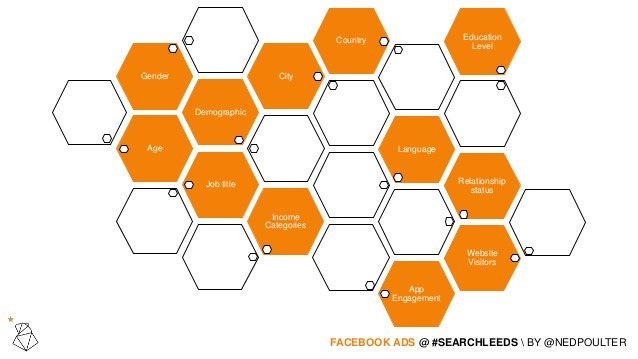
The 5 most valuable points we took from Search Leeds 2017
Digital marketing conferences are a great way to refresh your knowledge of the industry, mingle with other professionals, and hopefully learn something new from leading experts.
Search Leeds was no exception – and even worth us Londoners venturing up to Leeds at 7am. As a performance agency we are always looking to share our insight, so here are the top 5 things we took away from Search Leeds:
#1 Ad spend will increase your reach, but it doesn’t mean people will talk about it
The key takeaway here is that you have to evoke emotion in order to grab people’s attention and gain a worthy afterthought.
Laura Crimmons, Communications Director at Branded3, emphasised the importance of emotion in campaigns because without emotion your campaign will fade into the white noise.
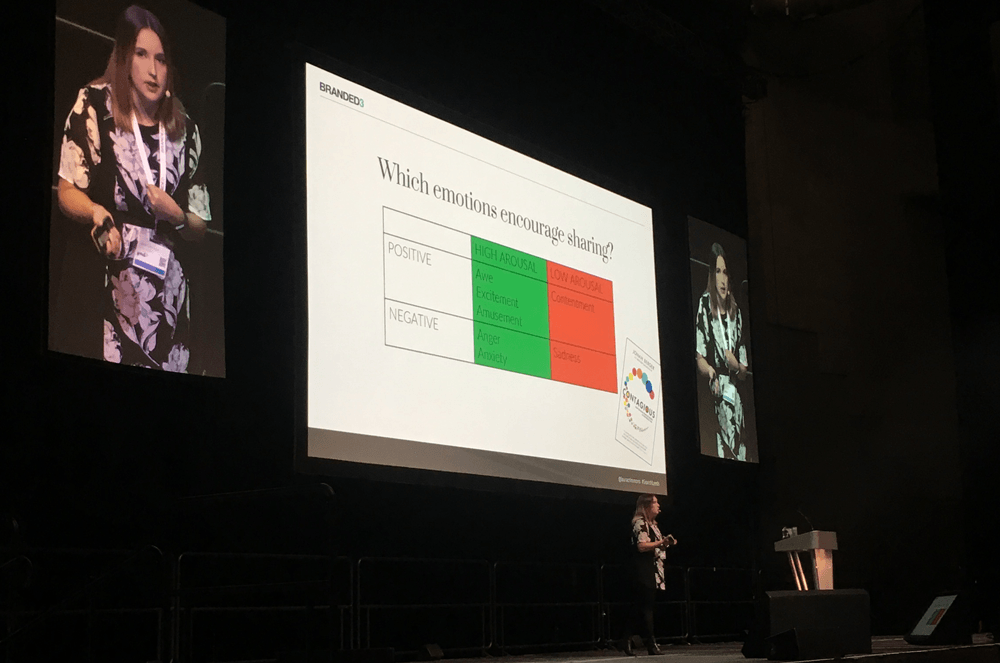
Laura Crimmons, Branded3 – Let’s get emotional
During development consider language, tone of voice and colours as these are all factors which represent different emotions.
Make your campaigns worth talking about – worth sharing.
If you can imagine your campaign concept being talked about at the pub, or over a lunch, then you know you are on the right track.
#2 Links are most certainly still relevant in 2017
Back in 2016, Penguin 4.0 was part of the core Google algorithm update which changed the way search is delivered today. Penguin 4.0 is progressive as it relies on bad links being assessed during Google’s crawl. It was developed to help reduce the manipulation of search results, which has led to the shift in the way links are relevant.
We see the effects of Penguin over time as it works on a page by page basis meaning we need to review all links in the link profile while considering intent and quality.
In 2017 links need to qualify the trust and intent of sites trust and to see if a page is worthy of consideration by the machines in order to rank. This makes links still relevant because they provide trust by confirming the user data Google already obtains. However, if you attempt to manipulate your link profile based on false intent, you will be at risk for a penalty.
The top tip from Paul Madden at Kerboo was to really know your link profile, and understand what might not pass to avoid any penalties.
Basically, aim to reduce your link debt, carry out general and thorough link maintenance, and be aware of the cycle of intent. It is critical to understand what Google considers as trust and intent.
It is no longer a volume game, it’s a game of quality and relevance.
#3 The future of search is led by digital assistants
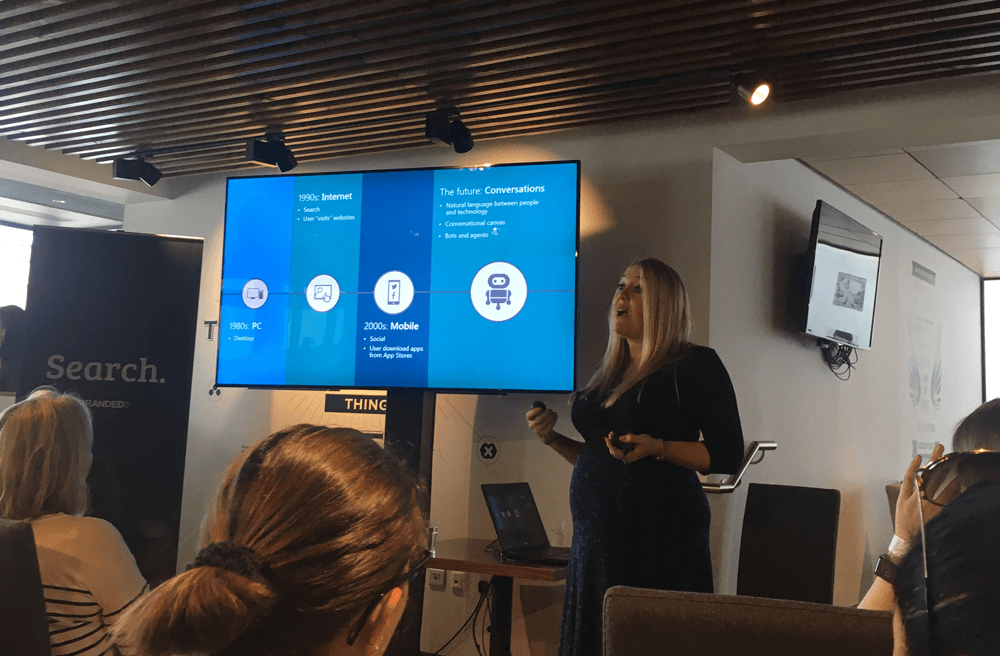
Ellie England, BingAds – The future of Search
We consume so much media on multiple devices every day that search marketing has had to evolve beyond the browser to compete. Rather than acting as an operational channel as it once was, search marketing is being used as a strategic function to help brands connect and engage with users at a personal level.
Search marketing currently has multiple purposes and offers incredible insight into the age across multiple channels. But if this is where we are now, what’s next?
Advanced personal assistants – 65% of smartphone owners use voice assistant so there is no surprise that we will see advanced development and understanding of subjective reasoning and personalisation within Siri, Alexa and Google Home.
Imminent dominance –: Did you know that there are more smartphones in the world than there are toothbrushes? And that we can also expect to see 50 billion devices by 2020? The rate in which smart devices are being developed and purchased means consumer expectations to search on any device, and across channels seamlessly, is going to go through the roof.
Don’t worry though, Bing has it under control – During Ellie England’s talk she emphasised how the popularity of digital assistants are actually going to help predict the future of search since they understand consumer behaviour, needs and problems on an individual level. This incredibly rich data will lead to a thorough understanding of trending topics and the sentiment behind them leading to more predictive analysis.
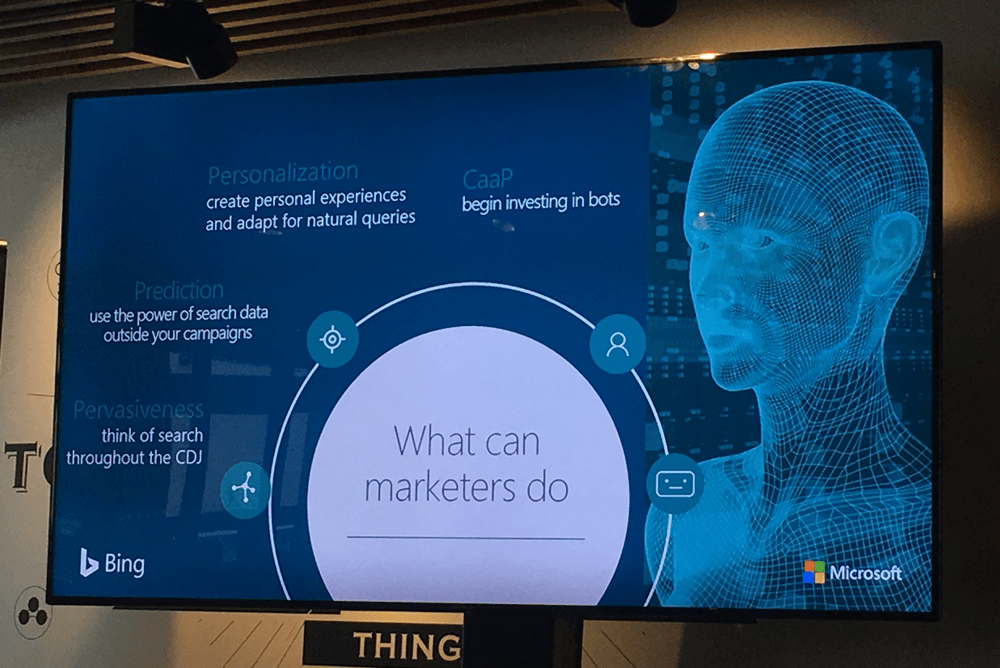
#4 Micro moments are leading the way in the age of curiosity
Stephen Power, the Agency Development Manager at Google, began his talk by highlighting how in a modern age of complexity there are lot questions and curiosity about the world around us – questions that are expected to be answered on our phones.
It is not ground breaking knowledge that to optimise for mobile you have to be visible by delivering the right message, at the right time, in the right time to the right person. Google have been talking about micro moments for a while now, but the theory is still as valid as ever.
The key takeaway here is that all of our search activity needs to be super optimised, strategically timed and targeted on such a micro level to make a lasting impression and see a worthy ROI. Understanding the consumer has never been so granular…
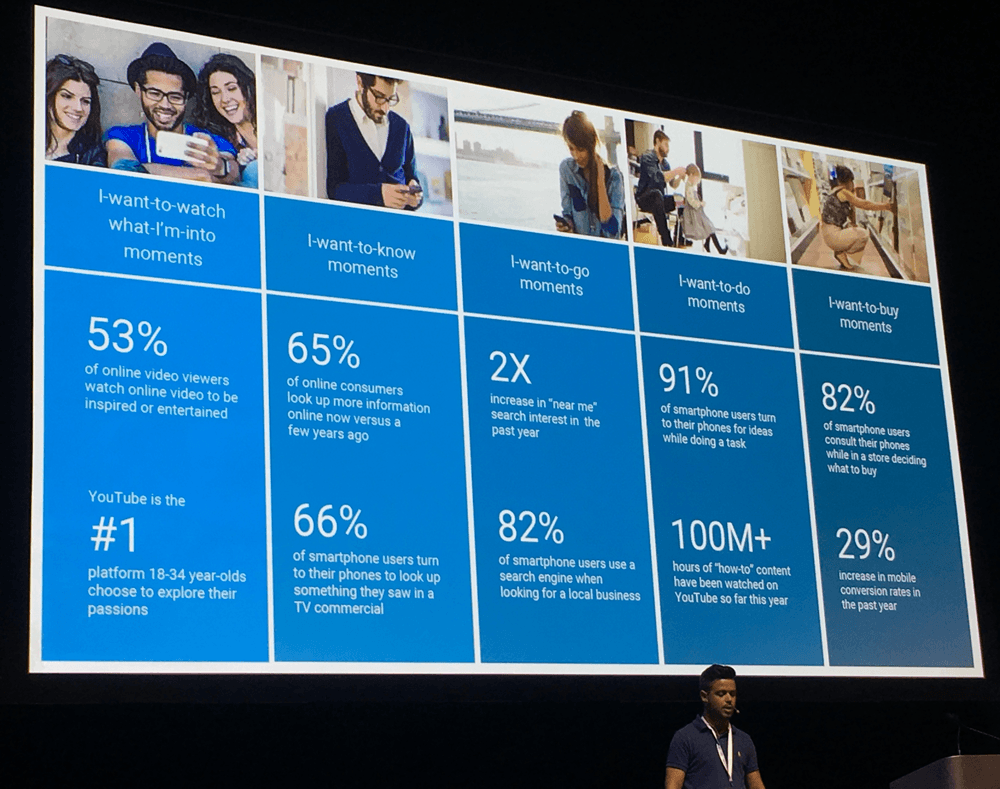
Stephen Power, Google – We don’t go online. We live online
#5 Don’t limit your Facebook ad targeting and pixel everything
Don’t hold back in exploring alternative targeting options with your Facebook ads. Go beyond keywords and explore user behaviour, job level or export your LinkedIn contacts to create a unique custom audience.
Utilise your Facebook video insights and deliver ads based on how long a user has watched your video. Address the user based on where they are in the sales funnel and deliver bespoke creative specific to their user journey. Even tap into the reach of your video by tagging products into the video post.
Ned Poulter, CEO and Founder of Pole Star Digital particularly emphasised the huge benefits of adding pixels to any significant landing pages on your website. With a pixel, you can track. With the ability to track you collect data. 1st party data gives you rich insight into your website traffic, so deliver Facebook ads based on their activity on your website.
If you are looking to further optimise your SEO strategy, or are looking to tighten up your ROI on paid search, why not drop us a message on info@harvestdigital.com and see how we can help you.


